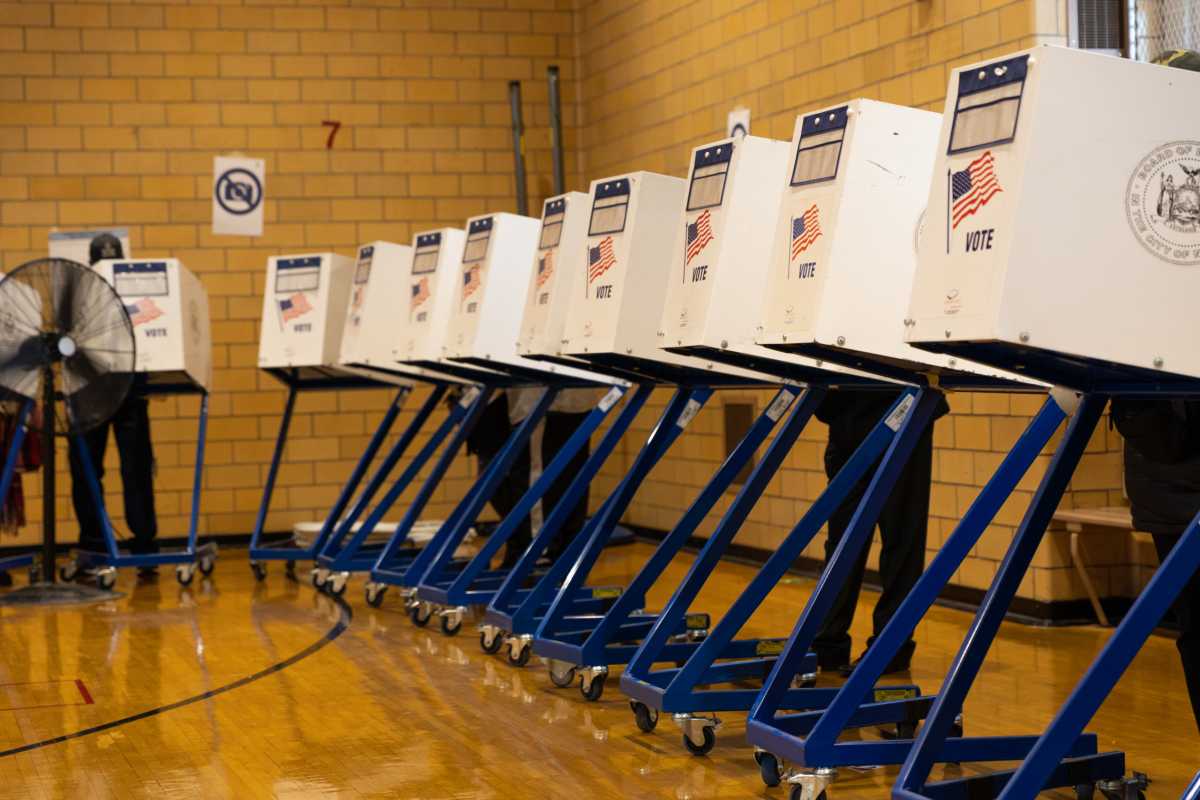Polls have officially closed and election results are starting to trickle in for control of the governor’s mansion, the state Legislature and Congress.
Voters had a lot to think about this election cycle. In Queens, residents were mainly concerned about crime and women’s rights. As of 6 p.m., the Board of Elections reported Queens had 338,321 votes counted, which included early voting.
Woodside voter Kathleen Lubey told QNS she wanted to vote for candidates in favor of women’s rights.
“I came out today because women should have a right to an abortion,” Lubey said. “It’s also keeping a Democratic governor in our state, and I voted for the cost of living proposal on the back of the ballot.”
In Astoria, voters trickled into the P.S. 171 Peter G. Van Alst polling place to cast their ballots. In northwestern Queens, residents are mainly concerned about crime and abortion.
Astoria resident, Catherine Prunella, said she was thinking about the Supreme Court overturning Roe v. Wade as she cast her ballot. She voted for Kathy Hochul for governor, not because she feels passionately about her as a candidate, but because she was unhappy with Lee Zeldin’s messaging surrounding abortion rights.
“I was very influenced on Zeldin’s stance on abortion,” Prunella said. “I have my issues with Hochul; I didn’t elect her in the first place, but Roe was huge this election cycle.”
Another voter, who wished to remain anonymous, said this was her first time voting in 20 years. She only cast her vote for one candidate: Zeldin.
“I’ve lived in the city forever and I’ve just never seen crime be this upsetting to me,” she said. “A change is good. If you keep doing the same thing over and over again, that’s the definition of insanity, so why not have some change?”
In Bayside, voter John Reiser also placed an emphasis on crime and bail reform. As a former corrections officer and city employee, Reiser said he supports bail reform as long as judges keep those who pose a threat to others incarcerated as they await their trials.
“Crime goes hand-in-hand with the bail reform,” Reiser said. “That was the biggest, dumbest idea. I also think cops aren’t making the same amount of quality arrests that they used to. It feels like they’re arresting more guys jumping tolls instead of getting murderers. The quality of life is going down.”
Mayor Eric Adams expressed confidence Tuesday morning that Gov. Kathy Hochul would win the hotly contested race against Congressman Lee Zeldin after voting for the incumbent at his Brooklyn polling site. Recent polls have suggested the race is much tighter than originally anticipated; FiveThirtyEight reported that as of Nov. 8, Hochul had a 7.8-point lead over Zeldin.
Two other statewide officials are also on the ballot: Democratic Attorney General Letitia James is seeking another four-year term in office against Republican Michael Henry, and State Comptroller Tom DiNapoli is looking to fend off a challenge from Republican Paul Rodriguez.
Senate Majority Leader Chuck Schumer is also seeking his fifth term in the Senate. He is being challenged by Republican Joe Pinion.
All of New York state’s 26 Congressional seats are also up for grabs. A key race to pay attention to in Queens is the Third Congressional District race, where Democrat Robert Zimmerman and Republican George Santos are looking to succeed the outgoing Tom Suozzi.
For more coverage of statewide and citywide elections, visit amNY.com and PoliticsNY.com.
QNS will update this story with unofficial results from the city’s Board of Elections as they become available. Results will not be official until they are certified by the Board of Elections.
Who’s on the ballot?
Assembly districts:
23rd: Stacey G. Pheffer Amato (Democrat), Thomas P. Sullivan (Republican) — Sullivan held a slight lead with 50.37% of the vote (15,246 votes) as of Wednesday morning, with 94.31% of scanners reported. Amato had 49.56% of the vote (15,000 votes).
24th: David I. Weprin (Democrat) — Weprin had beat out three opponents in the June primary, but got to relax on Election Day without a general election challenger.
25th: Nily D. Rozic (Democrat), Seth Breland (Republican) — Rozic led with 56.50% of the vote (11,126 votes) as of Wednesday morning, with 97.37% of scanners reported.
26th: Edward C. Braunstein (Democrat), Robert J. Speranza (Republican) — Braunstein led with 53.87% of the vote (17,748 votes) as of Wednesday morning, with 99% of scanners reported.
27th: Daniel Rosenthal (Democrat), Angelo King (Republican) — Rosenthal led with 57.60% of the vote (13,175 votes) as of Wednesday morning, with 99% of scanners reported.
28th: Andrew D. Hevesi (Democrat), Michael Conigliaro (Republican) — Hevesi led with 57.55% of the vote (19,416 votes) as of Wednesday morning, with 95.56% of scanners reported.
29th: Alicia L. Hyndman (Democrat) — Hyndman bested a challenger in the June primary, and was re-elected unopposed on Election Day.
30th: Steven B. Raga (Democrat), Sean S. Lally (Republican) — Raga led with 57.84% of the vote (10,972 votes) as of Wednesday morning, with 97.66% of scanners reported.
31st: Khaleel M. Anderson (Democrat): Anderson had no primary opponent in June, and no general election opponent, either.
32nd: Vivian E. Cook (Democrat), Marilyn Miller (Republican), Anthony D. Andrews Jr. (Working Families) — Cook led with 84.96% of the vote (16,828 votes) with 98.98% of scanners reported as of Wednesday morning.
33rd: Clyde Vanel (Democrat) — Vanel easily defeated a challenger in the June primary, and was re-elected without a general election opponent.
34th: Jessica Gonzalez-Rojas (Democrat) — Gonzalez-Rojas will gain a second term in office unopposed after being unchallenged in the June primary.
35th: Jeffrion L. Aubry (Democrat) — Aubry defeated a single challenger in the June primary, and had no opponent in the general election.
36th: Zohran Mamdani (Democrat) — Mamdani secured another term in office after running unopposed in both June and November.
37th: Juan Ardila (Democrat) — Ardila defeated four challengers for the seat long held by the outgoing Cathy Nolan. He’ll be sworn in as her successor in January.
38th: Jenifer Rajkumar (Democrat) — Rajkumar will gain a second term in office unopposed after being unchallenged in the June primary.
39th: Catalina Cruz (Democrat) — Cruz had no primary opponent in June, and no general election opponent, either.
40th: Ron Kim (Democrat), Sharon A. Liao (Republican) — Kim leads with with 51.84% of the vote (7,521 votes) with 99% of scanners reported as of Wednesday morning.
Congressional districts:
Third: Robert P. Zimmerman (Democrat), George A.D. Santos (Republican) — Santos led with 52.55% of the vote (142,017 votes) as of Wednesday morning, according to the state Board of Elections. The total includes votes out of Queens and Nassau counties. Zimmerman had collected more votes in Queens (22,594 to Santos’ 21,746), but the vote swung in Santos’ favor in Nassau County (120,271 to Zimmerman’s 97,466). Zimmerman conceded early Wednesday morning.
Fifth: Gregory W. Meeks (Democrat), Paul King (Republican) — Meeks led with 75.07% of the vote (97,981 votes) as of Wednesday morning, with 96.32% of scanners reported.
Sixth: Grace Meng (Democrat), Thomas J. Zmich (Republican) — Meng led with 63.19% of the vote (79,506 votes) as of Wednesday morning, with 97.19% of scanners reported.
Seventh: Nydia M. Velazquez (Democrat), Juan Pagan (Republican) — Velazquez led with leads with 77.64% of the vote (111,968 votes) as of Wednesday morning, according to the state Board of Elections. In Queens, she secured 68.40% of the vote (36,123 votes).
14th: Alexandria Ocasio-Cortez (Democrat), Tina Forte (Republican), Desi Cuellar (Conservative) — Ocasio-Cortez led with 67.18% of the vote (78,788 votes), as of Wednesday morning, according to the state Board of Elections. In Queens, she secured 65.67% of the vote (34,047 votes).
Senatorial districts:
10th: James Sanders Jr. (Democrat) — Sanders gained another term in the Legislature’s upper house after not having opponents in the August primary and November election.
11th: Toby Ann Stavisky (Democrat), Stefano Forte (Republican) — Stavisky declared victory Tuesday night. She led the race with 55.96% of the vote (34,784 votes) as of Wednesday morning, with 95.49% of scanners reported.
12th: Michael N. Gianaris (Democrat) — Gianaris had no primary opponent in August, and no general election opponent, either.
13th: Jessica Ramos (Democrat) — Ramos secured a new term in office unopposed in November after being unchallenged in the June primary.
14th: Leroy G. Comrie Jr. (Democrat) — Comrie had a stress-free election cycle, as he endured the June primary and the November general election without opponents in either contest.
15th: Joseph P. Addabbo Jr. (Democrat), Danniel S. Maio (Republican) — Addabbo lead with 56.86% of the vote (28,682 votes) as of Wednesday morning, with 94.86% of scanners reported.
16th: John C. Liu (Democrat), Ruben D. Cruz II (Republican) — Liu led with 57.67% of the vote (27,202 votes) as of Wednesday morning, with 99% of scanners reported.
18th: Julia Salazar (Democrat) — Salazar procured another term in office unopposed in November after being unchallenged in the August primary.
19th: Roxanne J. Persaud (Democrat) — Persaud also had an easy path to re-election this year, as she was unopposed in both the August primary and the November general election.
59th: Kristen S. Gonzalez (Democrat) — Gonzalez bested four others for the new triborough state Senate seat including parts of Manhattan’s East Side, western Queens and the northern tip of Brooklyn. The Democratic socialist will be sworn into her first term in office this January.
Citywide proposals
Make sure to turn your ballot over, where you will find four proposals regarding the environment, racial justice and more for New Yorkers to have a say on.
Proposal Number 1, an Amendment: CLEAN WATER, CLEAN AIR AND GREEN JOBS Environmental Bond Act of 2022
To address and combat the impact of climate change and damage to the environment, the “Clean Water, Clean Air and Green Jobs Environmental Bond Act of 2022” authorizes the sale of state bonds up to $4.2 billion to fund environmental protection, natural restoration, resiliency and clean energy projects.
Shall the Environmental Bond Act of 2022 be approved?
Proposal Number 2, a Question: Add a Statement of Values to Guide Government
This proposal would amend the New York City Charter to add a preamble, which would be an introductory statement of values and vision aspiring toward “a just and equitable city for all” New Yorkers, and include in the preamble a statement that the city must strive to remedy “past and continuing harms and to reconstruct, revise and reimagine our foundations, structures, institutions and laws to promote justice and equity for all New Yorkers.” The preamble is intended to guide the city government in fulfilling its duties.
Shall this proposal be adopted?
Proposal Number 3, a Question: Establish a Racial Equity Office, Plan and Commission
This proposal would amend the City Charter to Require citywide and agency-specific Racial Equity Plans every two years. The plans would include intended strategies and goals to improve racial equity and to reduce or eliminate racial disparities. It would also establish an Office of Racial Equity and appoint a chief equity officer to advance racial equity and coordinate the city’s racial equity planning process. The office would support city agencies in improving access to city services and programs for those people and communities who have been negatively affected by previous policies or actions, and collect and report data related to equity. It would establish a Commission on Racial Equity, appointed by city elected officials. In making appointments to this commission, elected officials would be required to consider appointees who are representative of or have experience advocating for a diverse range of communities. The commission would identify and propose priorities to inform the racial equity planning process and review agency and citywide Racial Equity Plans.
Shall this proposal be adopted?
Proposal Number 4, a Question: Measure the True Cost of Living
This proposal would amend the City Charter to require the city to create a “true cost of living” measure to track the actual cost in New York City of meeting essential needs, including housing, food, childcare, transportation and other necessary costs, and without considering public, private or informal assistance, in order to inform programmatic and policy decisions. It would require the city government to report annually on the “true cost of living” measure.
Shall this proposal be adopted?



































